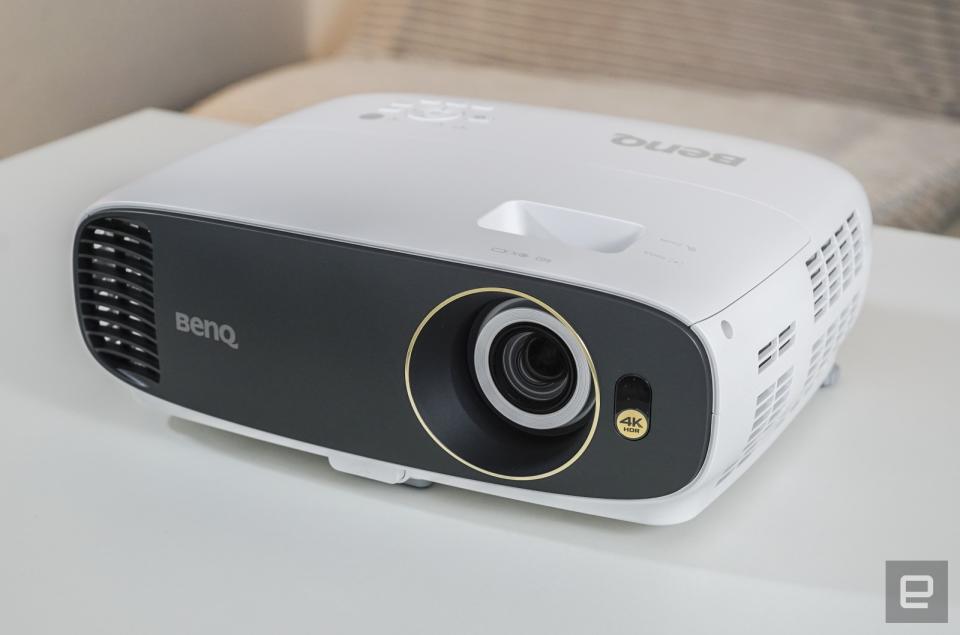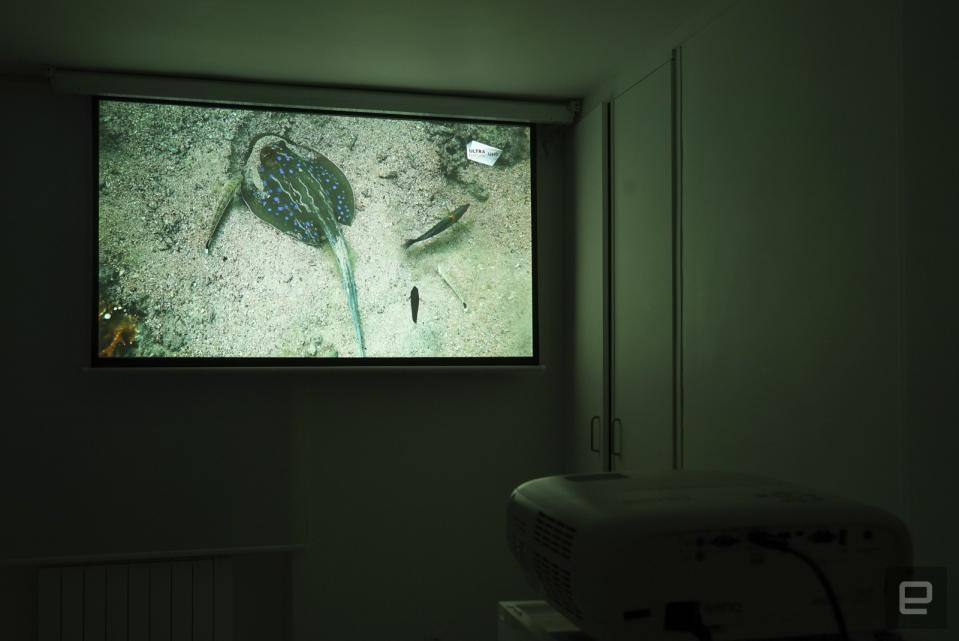BenQ's HT2550 is a well-priced 4K projector with some minor issues
Light leaking and excessive noise distract a bit from the excellent picture quality.
4K video is made to be seen on very large screens, and projectors are the cheapest way to do that. High-end models from Sony are out of reach, price-wise, for most of us, but cheap 4K projectors from BenQ, Optoma and others are finally hitting the market. One of the cheapest and most interesting is BenQ's HT2550 (known as the W1700 in some markets), priced at $1,500 and packing true 4K and HDR resolution. It delivers perhaps the most detailed image of any cheap new 4K projector, but it has a few flaws that should give you pause. Physically, the BenQ HT2550 looks pretty sharp, and with a white body and black-and-gold front, should fit into most home theater decors. At 10 pounds, it's relatively light and compact compared to rival models like Epson's Home Cinema 4000, making it easy to take it down from the ceiling and use for night wall projections in summer, for instance. The HT2550 DLP projector has a pixel resolution of 1080p, not 4K. To get 4K, it "pixel shifts" the image four times, producing a true Ultra HD (3,840 x 2,160) result. Texas Instruments manufactures the tiny DLP chip and promises that you do get 4K worth of pixels on the screen. The reason BenQ, Optoma, Acer and other manufacturers don't use true 3,840 x 2,160 chips -- when you can buy a 55-inch TV with that actual resolution for $500 -- is cost. While the pixels on a TV are relatively large, putting the same number on a 0.47-inch chip is a lot harder. Until the prices drop, the only place you'll see them is high-end cinema projectors from the likes of Christie, or spendy home units from Sony and JVC. The Ultra HD tech used by BenQ is a cheat, but it's a good cheat. Keep in mind that with any 4K projector, or TV for that matter, many viewers won't discern the extra detail in 4K anyway. Even aficionados say that the improvement is between 10-20 percent over 1080p under optimal viewing conditions. That means sitting fairly close (around six to eight feet) to a 100-inch screen. My own screen yields an 80-inch picture, so I sat even closer to best judge the image. It outputs a healthy 2,200 lumens of light, but you won't get that unless you're in bright mode, which infects the image with a green tint. Lamp life is rated for 4,000 hours in bright mode, but several times more than that under regular use. It also offers 3D, making it one of the few 4K projectors under $2,000 with that feature. The HT2550 can output 1.07 billion colors (30 bits) with native 16:9 support and HDR, so you can expect smooth color gradients and detail in dark and bright areas. Input lag is 50ms, which is okay but probably not good enough for many gamers -- the best projectors for that have lag less than 20 milliseconds. Finally, the HT2550 has a single 5W speaker that's actually good enough to use in a pinch, with less tinny sound than most models but still a far cry from a home-theater system. The HT2550 has a 1.2 zoom lens and keystone digital adjustment support, but no optical lens shift to square the image. That means I needed to have the projector lens in the center of the screen, at a fairly tight distance, and just above or below the top or bottom of the screen, which I did, luckily. If you need to use the keystone adjustment, it can distort or reduce the resolution of the image, unlike a shift lens -- which is available on the rival $1,800 Optoma UHD 60. Connection-wise, the BenQ HT2550 has an HDMI 2.0 port for 4K, 60Hz video and an HDMI 1.4 port for anything less. I have 1Gbps fiber internet and a 4K TV decoder with HDR support, along with a 4K HDR Google Chromecast Ultra. So that brings up one issue. Because both of those devices have to be connected to the HDMI 2.0 port to deliver 4K HDR, I also had to invest in a decent switch. Here's another problem. It's impossible for me to use my 4K cable decoder from the spot where it normally sits, connected to the projector by a 10m (33 foot) cable. As mentioned, 4K is only supported by the box via an HDMI 2.0 port, but there's no image when it's connected with the long cable. With a shorter cable, however, it works just fine. Most projector installations, I'd guess, are permanently mounted on the ceiling, so cable length issues are more likely to affect projectors than TVs. As others have pointed out, this problem happens much more with HDMI 2.0 and can be device dependent. My Chromecast Ultra, for instance, does work with 4K HDR and the 10m cable. To fix the issue with the 4K TV decoder, I might need to change the cable or use some kind of signal booster. The HT2550 is reasonably bright, letting you watch TV casually with some ambient light. If you want to appreciate the 4K and HDR, however, you'll need to reduce the room brightness as much as possible. Contrast is also relatively low at a rated 10,000:1. If you need a brighter, more contrasty projector, you'll probably want to look at the Optoma's much brighter $1,800 UDH60 4K projector, which has 3,000 lumens compared to the BenQ's 2,200 lumens. Brightness and contrast are further reduced in 3D. If you'll only use that setting from time to time, that's not a deal breaker, but if you have a big collection of 3D DVDs, you might want to investigate a brighter 3D projector like Epson's $1,800 Home Cinema 4000. The BenQ model produces a true 4K image at 24, 30 and 60 Hz (you can see that for yourself using a test pattern like this one). It can upsample HD, but to my eyes, it was clearly sharper with the 4K video I viewed, including Netflix programs like Jessica Jones, The Crown, Altered Carbon and Stranger Things. The sharpness, however, varies depending on the distance you are from the screen. About 12 to 15 feet away, I can see the difference in fine details like hair or landscape scenes. The more you watch and get used to 4K, the easier it is to appreciate its superiority over HD, regardless of viewing distance. The difference with HDR is a bit subtler. The BenQ HT2550 is supposed to automatically detect and activate HDR, but it doesn't always do so. With Stranger Things, for instance, I had to force it into HDR mode to get it to work. Once it's turned on, the result is a punchier image with more detail in brighter and darker regions. HDR10, however, is an inferior system compared to Dolby Vision or Samsung and Amazon's HDR10+, so don't expect miracles. In terms of color accuracy, the BenQ's projection is a touch blue out of the box, so if you're a maniac for true colors, or just want a warmer image, you'll need to calibrate it first. If you take the time to set up the colors first, though, you'll get much more accurate and punchier colors in both HDR and standard 4K modes. Personally, I changed the default color temperature from cool to normal and bumped the contrast two percent, which fixed the blue issue and made the image less muddy. The picture is excellent for the price, but the BenQ HT2550 is not without its faults. In standard (not quiet) mode, I found the fan noise can be excessive and even buzzy, something that other buyers have noticed as well. The projector also had some early quality control issues, as the 3D didn't work for many folks who bought it when it first came out, and BenQ had to issue a firmware patch. Another bothersome issue is light leaking. It projects a dark gray frame a few inches wide that will fall on the walls around your screen. If your walls are white like mine, it's noticeable. Projector Central notes that all projectors using that DLP chip have the same problem. Despite some issues, BenQ's HT2550 is one of a handful of ground-breaking projectors that finally offer 4K at an entry-level price. At $1,500, it's certainly one of the cheapest ways to deliver a 100-plus-inch, 4K HDR image. For around the same price, you can get a good-quality 4K 65-inch TV, but stepping up just 10 inches to a 75-inch model will cost you thousands more. I've spent a few weeks with the HT2550 and used it as my regular TV. I'm consistently impressed with the image quality, especially when watching high-quality drama series and movies that have been carefully graded for HDR. As someone who wants to replicate the cinema experience at home without spending a fortune, the HT2550 fulfills my needs nearly perfectly.
Features

Setup

Performance



























